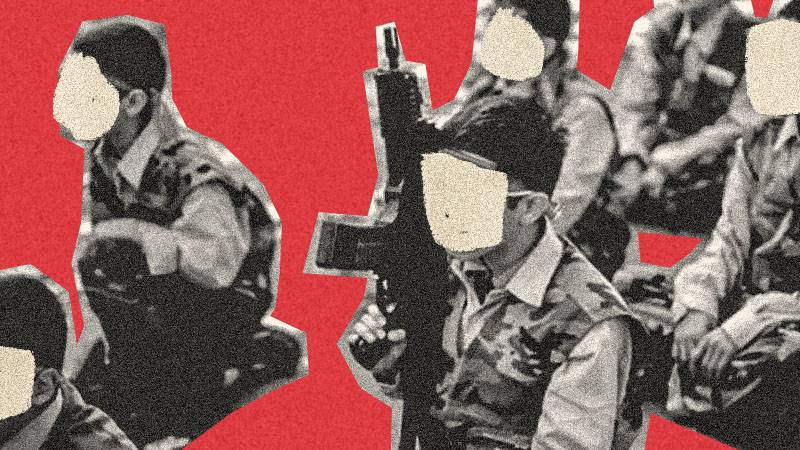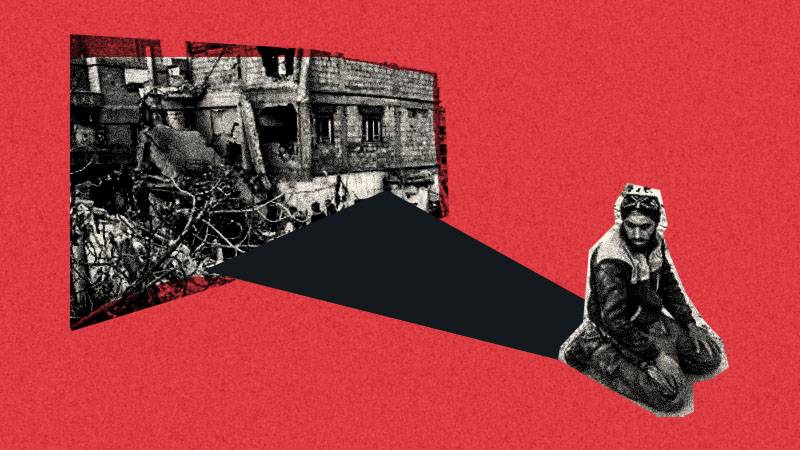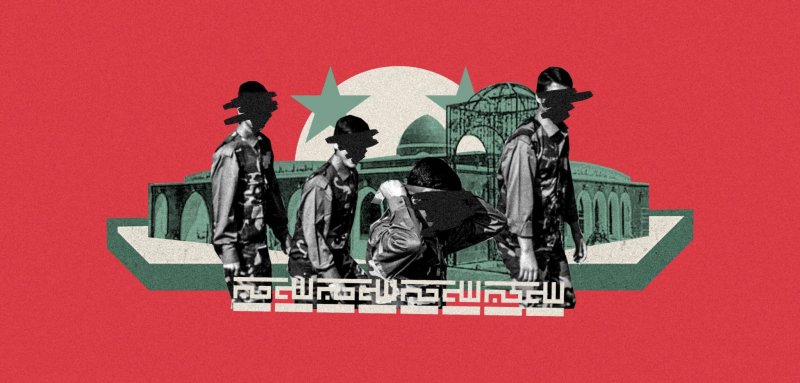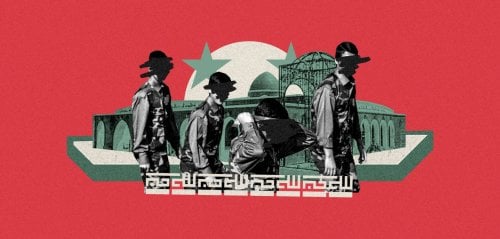At the turn of the third millennium, Iran had extended an offer to provide services in the "Ain Ali" region, nestled in the outskirts of Al-Mayadin city in the countryside of Deir ez-Zor in eastern Syria. Their proposal included the construction of a mosque, with local residents slated to oversee its administration. However, the inhabitants of Al-Mayadin and its neighboring villages rejected this proposition.
Today, in a rather unsettling turn of events, the "Ain Ali" area has fallen under the supervision and sway of Iran, and it has undergone transformations. Domes have been erected, and its grounds have been meticulously paved to receive "pilgrims."
A sacred healing spring and child recruitment centers
Ain Ali has long been regarded as a sacred spring whose waters are believed to possess healing properties, a conviction firmly held by the local populace. However, for Iranians, it carries profound spiritual significance linked to Ali ibn Abi Talib. Iran vigorously encourages pilgrimage to this site and promotes a narrative asserting that the spring gushed forth miraculously from beneath the hooves of Ali ibn Abi Talib's steed during his fateful journey with his warriors to the Battle of "Siffin" near the city of Raqqa.
Iran's purported intent in assuming control over this region might initially appear to be spiritual, appealing to the sensibilities of those who love "Ahl al-Bayt". Yet, this piety swiftly dissipates upon the revelation that in close proximity to this site, particularly along the road to "Al-Rahbah Citadel" near the spring, lies the "Al-Basira" center—a center for training children in combat.
Supervised by "Hajj Ibrahim," an Iranian man, the center receives youngsters aged between 15 and 18 years old. These adolescents have previously undergone courses at the "Al-Shadouhi Center" within the precincts of Al-Mayadin city, under the management of two individuals, namely Talal Al-Hamawi and Qais Abu Sarmad Al-Deiri, according to the Ain Furat News Network, a Syrian media outlet specializing in coverage of the eastern region.
The network has reported that the "Al-Shadouhi Center," inaugurated in May 2019, was established by the Jihad Al-Binaa Association—an entity closely affiliated with the Iranian Revolutionary Guard—in May 2019. The center's mission is to prepare children ideologically. After their graduation from this institution, they usually head to the "Al-Basira" center, ensconced in the outskirts of Al-Mayadin city. There, they partake in courses spanning up to three months, encompassing physical and ideological instruction, along with weapons training.
Once a child completes his training with "Hajj Ibrahim," his name is duly registered with the Nasr Center, an establishment overseen by Iranians, nestled in Deir ez-Zor's Al-Sina'ah neighborhood. Subsequently, the child is dispatched to the 137th Brigade, where they undergo a two-week course, training in weapons and tasks they will be assigned to in the future when posted to Iranian bases.
Where do these children go after the camps?
Abdullah (pseudonym), a 16-year-old hailing from Al-Mayadin, has recently escaped the grasp of the "Village Security" forces, a contingent overseen by the Revolutionary Guard. His journey led him to the eastern banks of the Euphrates River, an enclave under the control of the Syrian Democratic Forces (SDF). Abdullah is now trying to enter Turkey, aided by local smugglers, with the ultimate aim of reaching Europe.
Abdullah tells Raseef22, "I left school and joined when I was 14 years old. Some of my fellow volunteers were as young as 12. The key to being accepted as a volunteer is having a large build."
He proceeds, "We were gathered at a center near Al-Rahbah Citadel, where we underwent military training. After this, our names were registered in Deir ez-Zor. Once our names are registered, we could be assigned to 'Village Security' groups that operate in the countryside, especially at river crossings."
These individuals earn no more than 60,000 Syrian pounds (48 USD) in monthly salaries. However, they benefit from "al-Jamarka," which involves 'taxing' money from citizens crossing between the banks of the Euphrates River.
While Iran's goal of controlling the Ain Ali region near Syria's Al-Mayadin city may initially appear to be spiritual, this piety dissipates when one discovers the presence of a center actively training children for combat.
There are others who willingly decide to enter combat and join Iranian-affiliated militias in other regions, with their salaries exceeding 200,000 Syrian pounds (approximately 160 USD).
Additionally, there is a third group of children and adolescents who have embraced Shiism. These individuals become close to the "Hajj", the local leader of the area, and receive training to serve as escort agents.

Abdullah, for instance, elaborates, "I opted for Village Security. We were responsible for patrolling river crossings and would receive lists of individuals to arrest from security agencies. However, we didn't scrutinize much; what mattered to the recruits was acquiring money and smoking."
He adds, "At times, we were thrown into battles to assert control against Fourth Division checkpoints or militias vying for dominance in the region. However, recently, a significant portion of us has been transferred to desert areas, where ISIS cells are gaining ground, and they haven't returned, which prompted me to flee."
Centers for non-combatant children
It's worth noting that not all centers established by Iranians are oriented towards combat training. According to reports from the Ain Furat News Network, the "Bright Light" center (formerly known as the Hisba Center during the ISIS era) hosts over 250 children for two days each week, and not for combat training. Here, children receive gifts, food, and toys, in addition to religious and guidance lessons led by two Iranians, Sayed Ayoub and Sayed Mahdi, both proficient in the Arabi languagec.
"Joining the Iranians would provide him with money for his expenses and help us in the face of rising prices in the region".. Why do (Sunni) parents allow their children to join Iranian-affiliated militias in Syria's Deir ez-Zor? The answer is simple: poverty
According to the Syrian Observatory for Human Rights, Iran's objective, via the Bright Light center, is to "recruit young people and children to bolster Iranian presence in the region, through military training".
The underlying cause: poverty
Why don't parents, predominantly Sunni, prevent their children from joining Iranian-affiliated militias or centers? The answer lies in a simple yet harsh reality: poverty.
Iran capitalizes on the economic hardships of Syrians and has successfully recruited over 11,000 Syrians across the country, according to Rami Abdulrahman, the director of the Syrian Observatory for Human Rights.
In a prior report by the observatory, when it indicated that the number of recruits stood at approximately 9,000 individuals, around 3,600 young Syrian men of varying ages had been "enlisted within the ranks of Iranian forces and their affiliated militias, operating within the western part of the Euphrates River in Deir ez-Zor's countryside." The rest of them had been recruited in the southern Syrian region. Presently, activists assert that the number of these recruits has exceeded 4,000 individuals.

Parents find themselves preoccupied with the pressing need to secure a means of livelihood, especially given the extremely challenging economic circumstances. This compels them to permit, and at times, even push their children to join Iranian-affiliated militias, all in the pursuit of securing a paycheck, food provisions, along with special treatment and free healthcare at the healthcare facilities established by Iran in the region.
Abu Yasser (pseudonym), a 49-year-old government employee with a monthly income of approximately 45,000 Syrian pounds (equivalent to around 36 dollars), is a father to six children. Recently, his 17-year-old son volunteered to join the ranks of Iranian militias. He shares with Raseef22, "I am well aware that his decision to join the Iranian Guards is a mistake, yet we have no other alternative. It's either he remains by my side, subjecting himself to mandatory military service with the Syrian army and deployment to conflict zones in Idlib, where he will die, a fate similar to that of numerous young men from our village. Or he joins the Guards, which would guarantee me his presence in the region."
He goes on to say, "His joining the Iranians would provide him with enough money for his expenses and could potentially help us in the face of the wave of rising prices that the entire region is experiencing."
In any scenario, parental consent does not factor as a prerequisite for a young man or child to align themselves with Iranian militias. In numerous instances, these teenagers, enticed by the allure of financial incentives, power, and the prospect of acquiring weaponry, may defy their own families. And these weapons have begun to claim the lives of some of their bearers during their assignments, adding them to the roster of hundreds of Afghan and Iraqi children who perished in battle alongside the Revolutionary Guards in times past.
Iran seeks to complete its Shia crescent by controlling the Deir ez-Zor regions, thereby extending its influence from Tehran to Beirut, passing through Baghdad and Damascus. It doesn't hesitate to exploit the economic need of the population and the absence of official medical services.
However, the recruitment of children signifies the single most pivotal and perilous phase within the framework of its overarching scheme. The impact and repercussions of this endeavor are likely to endure, even if Iran is eventually forced to withdraw from Syria.
Raseef22 is a not for profit entity. Our focus is on quality journalism. Every contribution to the NasRaseef membership goes directly towards journalism production. We stand independent, not accepting corporate sponsorships, sponsored content or political funding.
Support our mission to keep Raseef22 available to all readers by clicking here!
Interested in writing with us? Check our pitch process here!






